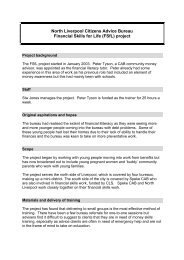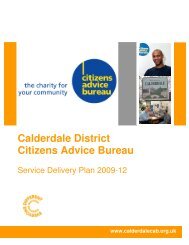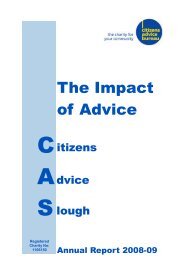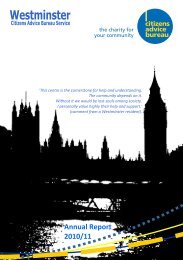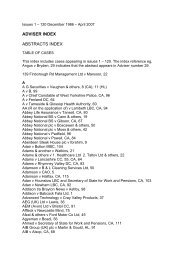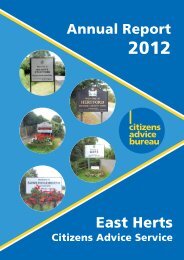Serious benefits - Citizens Advice
Serious benefits - Citizens Advice
Serious benefits - Citizens Advice
- No tags were found...
You also want an ePaper? Increase the reach of your titles
YUMPU automatically turns print PDFs into web optimized ePapers that Google loves.
Spring 2003<br />
<strong>Serious</strong> <strong>benefits</strong><br />
The success of CAB benefit take-up campaigns
The <strong>Citizens</strong> <strong>Advice</strong> service helps<br />
people resolve their legal,<br />
money and other problems by<br />
providing information and<br />
advice, and by influencing<br />
policymakers. High quality<br />
advice and information is<br />
delivered from over 2000 outlets<br />
across England, Wales and<br />
Northern Ireland, as well as by<br />
telephone, via the Internet, by<br />
email and through the media.<br />
<strong>Citizens</strong> <strong>Advice</strong> Bureaux deal<br />
with over 1.6 million social<br />
security problems each year and<br />
check that all eligible <strong>benefits</strong><br />
and tax credits are being<br />
received by their clients. In<br />
addition, many run benefit<br />
take-up campaigns to ensure<br />
that local people are receiving<br />
the <strong>benefits</strong> and tax credits to<br />
which they are entitled.<br />
Published in April 2003<br />
by <strong>Citizens</strong> <strong>Advice</strong>,<br />
115-123 Pentonville Road,<br />
London N1 9LZ<br />
<strong>Citizens</strong> <strong>Advice</strong> is an operating name<br />
of The National Association of<br />
<strong>Citizens</strong> <strong>Advice</strong> Bureaux. Registered<br />
charity number 279057.<br />
Additional copies of <strong>Serious</strong> <strong>benefits</strong><br />
can be downloaded or ordered at<br />
www.citizensadvice.org.uk<br />
or on 020 7833 7054<br />
This issue of CAB News was<br />
researched and written by Miranda<br />
Kemp and designed by Matt Bellamy.<br />
Photo credits: Front cover Getty Images, p4<br />
Luton Borough Council; p5 Association for<br />
London Government; p6 Justin Piperger; p7<br />
NEA; p8/10 <strong>Citizens</strong> <strong>Advice</strong> Scotland; p9 Simon<br />
Ridgway; p11 Arthur Rank Centre; p14 Mark<br />
McKenzie; p15 Littlehampton CAB; p16<br />
Department for Work and Pensions<br />
All <strong>Citizens</strong> <strong>Advice</strong> Bureaux that collect data<br />
on extra <strong>benefits</strong> gained for clients, must<br />
follow a set procedure and only record benefit<br />
amounts after payment is confirmed. Figures<br />
are based on one-off lump sum payments,<br />
including back-dated gains, plus increased<br />
income for one year only. More information is<br />
available on request from <strong>Citizens</strong> <strong>Advice</strong><br />
Information on 020 7833 2181.<br />
Key contacts in the <strong>Citizens</strong> <strong>Advice</strong> service to discuss<br />
developing partnerships:<br />
Celia Pyke-Lees<br />
Director of Services<br />
020 7833 7125<br />
celia.pyke-lees@citizensadvice.org.uk<br />
Carey Wood-Duffy<br />
Services Manager, <strong>Citizens</strong><br />
<strong>Advice</strong> Cymru<br />
01745 586 400<br />
carey.wood-duffy@citizensadvice.org.uk<br />
Fran Targett<br />
Director, <strong>Citizens</strong> <strong>Advice</strong> Cymru<br />
01745 586 400<br />
fran.targett@citizensadvice.org.uk<br />
East:<br />
Anne Moynihan 01223 356322<br />
London:<br />
Bobbie Pote 020 7549 0800<br />
Midlands:<br />
Kamaljit Sandhu 0115 941 8315<br />
North:<br />
Peter Rickard 0191 233 0700<br />
Better <strong>Advice</strong> Better Health,<br />
Delyth Owen<br />
01970 636629<br />
Buckingham CAB,<br />
Margo Parfitt<br />
01280 816787<br />
Cambridge CAB,<br />
Sonia Archdale<br />
01223 222686<br />
<strong>Citizens</strong> <strong>Advice</strong> Devon<br />
Welfare Rights Unit,<br />
01392 431616<br />
<strong>Citizens</strong> <strong>Advice</strong> Somerset<br />
Welfare Rights Unit,<br />
Elizabeth Luke<br />
01823 275985<br />
<strong>Citizens</strong> <strong>Advice</strong> Surrey<br />
Welfare Rights Unit,<br />
Maria Zealey<br />
01276 26707<br />
Epsom & Ewell Borough Council,<br />
Pauline George<br />
01372 732000<br />
Chris Bates<br />
General Manager, Bureau<br />
Development<br />
0115 941 8315<br />
chris.bates@citizensadvice.org.uk<br />
Or contact one of our regional managers:<br />
Jackie Robinson<br />
Head of National Development<br />
020 7833 7012<br />
jackie.robinson@citizensadvice.org.uk<br />
North West:<br />
Paul Allen 0151 282 9000<br />
South East:<br />
Tina Thompson 02380 273 355<br />
South West:<br />
Pamela Woods 01392 425 517<br />
Contacts for the projects featured in this publication:<br />
Havering CAB,<br />
Heather Ball<br />
01708 735325<br />
Luton CAB,<br />
Ruth White<br />
01582 487802<br />
Luton Borough Council<br />
Affordable Warmth Scheme,<br />
Sarah Allen<br />
01582 546979<br />
Newcastle CAB In-Work<br />
Benefit Project,<br />
Pat Barrett<br />
0191 276 6396<br />
Norwich CAB<br />
Steve Wiseman<br />
01603 660857<br />
Royton CAB 60+ campaign,<br />
Tahra Javed<br />
0161 624 5603<br />
Tamworth CAB,<br />
Susan Lamb<br />
01827 709648<br />
Uttlesford CAB,<br />
John Willoughby<br />
01799 526557<br />
2 <strong>Serious</strong> <strong>benefits</strong>
Introduction<br />
Inside...<br />
“The work done by <strong>Citizens</strong> <strong>Advice</strong> Bureaux in benefit take-up is<br />
absolutely invaluable. However much we try to make things<br />
simple, it’s in the nature of benefit rules that there are some<br />
complexities and it’s important that people are helped through<br />
them. Sometimes if they’ve got cause to complain against us,<br />
then it’s right that there is someone independent to represent<br />
them.” Andrew Smith, Secretary of State for Work and Pensions<br />
Since the inception of the<br />
welfare state, <strong>Citizens</strong> <strong>Advice</strong><br />
Bureaux have been helping<br />
people to get the <strong>benefits</strong> and<br />
assistance to which they are<br />
entitled and in 2001-02, CAB<br />
advisers helped with over<br />
1.6 million benefit and tax<br />
credit problems.<br />
Benefit take-up campaigns<br />
are run by many <strong>Citizens</strong> <strong>Advice</strong><br />
Bureaux, targeting sections of<br />
the community who are failing<br />
to claim what is rightly theirs,<br />
including elderly people, people<br />
with disabilities and low-income<br />
families.<br />
People over 75 are the largest<br />
group not to claim their<br />
entitlements, despite antipoverty<br />
measures, such as the<br />
minimum income guarantee<br />
(MIG), designed to benefit the<br />
two million pensioners who live<br />
in poverty.<br />
A National Audit Office*<br />
report estimated that a third of<br />
those entitled to MIG did not<br />
claim it. This jumped to a<br />
possible two-thirds for some<br />
other <strong>benefits</strong>. The stigma of<br />
claiming by a generation<br />
brought up to ‘make do and<br />
mend’ is great. Long,<br />
complicated forms and a<br />
confusing claims process are also<br />
big barriers.<br />
The effect of not claiming<br />
entitlements can be profound.<br />
It can mean scraping by on an<br />
unnecessarily low income,<br />
struggling to afford to pay<br />
for basics.<br />
The reorganisation of the<br />
<strong>benefits</strong> system and emphasis on<br />
means-testing, makes the takeup<br />
work of <strong>Citizens</strong> <strong>Advice</strong><br />
Bureaux all the more vital.<br />
<strong>Serious</strong> <strong>benefits</strong> looks at that<br />
work, the keys to success, the<br />
partnerships that succeed and<br />
the people who gain.<br />
There is much to be proud of.<br />
Estimates are that some CAB<br />
benefit take-up campaigns net<br />
as much as £85 for claimants for<br />
each £1 spent on running them<br />
– money which helps lift that<br />
person out of poverty and<br />
<strong>benefits</strong> the community in<br />
which it is spent.<br />
It’s not just claimants who<br />
gain from CAB benefit take-up<br />
work. For each local person<br />
claiming a particular benefit<br />
(capped at a certain level), the<br />
local authority receives a set<br />
amount of extra cash from the<br />
Government. This can bring in<br />
many thousands of pounds for<br />
the local authority.<br />
We discuss the importance of<br />
securing on-going funding and<br />
look at some of the innovative<br />
one-off projects and strong<br />
partnerships that have achieved<br />
exciting results.<br />
And we ask the Secretary of<br />
State for Work and Pensions,<br />
about government initiatives to<br />
increase claiming and the value<br />
of <strong>Citizens</strong> <strong>Advice</strong> Bureaux work.<br />
4 CAB research shows how<br />
benefit take-up work can<br />
radically improve the lives<br />
of older people who are<br />
under-claiming their<br />
entitlements.<br />
6 Targeting, home-visiting<br />
and ongoing support are<br />
key to improving benefit<br />
take-up amongst hard-toreach<br />
groups.<br />
8 Good advice is good for<br />
your health.<br />
10 Why pooling resources and<br />
sharing experience across<br />
agencies is the way<br />
forward.<br />
12 Benefit take-up work is<br />
vital, raising people’s<br />
incomes and putting cash<br />
back into local<br />
communities. So why isn’t<br />
money to fund the work<br />
more forthcoming<br />
14 CAB money and <strong>benefits</strong><br />
advice can help keep<br />
tenants out of courts and in<br />
their homes.<br />
15 <strong>Citizens</strong> <strong>Advice</strong> Bureaux<br />
share their benefit take-up<br />
campaign expertise.<br />
16 Andrew Smith, Secretary of<br />
State for Work and<br />
Pensions tells us how the<br />
Government is addressing<br />
benefit under-claiming.<br />
<strong>Serious</strong> <strong>benefits</strong> 3
Benefit wisdom<br />
“We have had our <strong>benefits</strong> increased, help we did not know was<br />
available. It certainly has had an effect on our health and wellbeing.<br />
We now have someone to turn to.” An elderly London<br />
couple, CAB clients<br />
The current generation of<br />
pensioners are the most<br />
affluent ever and yet two<br />
million of them live in poverty.<br />
Many are not aware of the<br />
<strong>benefits</strong> to which they are<br />
entitled and elderly people<br />
under-claim <strong>benefits</strong> more than<br />
any other group. As many as<br />
870,000 people fail to claim<br />
means-tested assistance,<br />
struggling by on an<br />
unnecessarily low income and,<br />
according to the National Audit<br />
Office, as much as £1.8 billion<br />
went unclaimed by pensioners<br />
in 1999-2000.*<br />
be replicated by others.<br />
The results of the survey<br />
confirmed time and again, that<br />
older people are simply not<br />
getting the advice and<br />
assistance they need to claim<br />
their full benefit entitlements<br />
and are missing out on cash that<br />
would greatly improve the<br />
quality of their lives - money<br />
that would lift many of them<br />
out of poverty.<br />
Of the <strong>Citizens</strong> <strong>Advice</strong><br />
Bureaux that reported back,<br />
102 had carried out take-up<br />
campaigns. Of those, 68 gave<br />
details of the financial gains<br />
generation brought up to cope<br />
and take responsibility for<br />
themselves and their families.<br />
As Rosa Vasquez, benefit takeup<br />
campaign co-ordinator from<br />
Havering CAB, says, “In the back<br />
of their minds they might know<br />
they could be due more, but<br />
many are very private people<br />
and proud people as well.”<br />
For many, the desire to<br />
remain in their own home is a<br />
motivating factor in their<br />
decision not to claim<br />
entitlements. Plymouth CAB<br />
noted that, “fear of being<br />
forced into residential or<br />
nursing care is common.<br />
Reassurance is necessary that an<br />
attendance allowance claim is<br />
actually aimed at keeping<br />
people in their homes.”<br />
Camden CAB also found that<br />
encouraging people to see<br />
<strong>benefits</strong> as a ‘right’ and not a<br />
hand-out – something that they<br />
were entitled to – helped to<br />
remove any anxieties that “their<br />
need for help of either a<br />
The <strong>benefits</strong> picture<br />
In 2001, <strong>Citizens</strong> <strong>Advice</strong> Bureaux<br />
were asked about their<br />
experience of running benefit<br />
take-up campaigns with older<br />
people to establish the extent of<br />
benefit take-up campaigns at a<br />
local level and to find examples<br />
of effective practice that could<br />
Extra cash reduces pensioner poverty<br />
“As you can imagine, the extra money<br />
has made a huge difference to me.”<br />
made for clients, an estimated<br />
£13 million in unclaimed<br />
<strong>benefits</strong>. Many bureaux work<br />
with other local agencies such as<br />
GP surgeries, hospitals, local<br />
authority social services, housing<br />
departments, social landlords<br />
and voluntary organisations to<br />
maximise income for people<br />
who may not be aware of what<br />
they are entitled to.<br />
So why do older people fail<br />
to claim what is theirs<br />
Pride and privacy<br />
Our survey of <strong>Citizens</strong> <strong>Advice</strong><br />
Bureaux found that there are<br />
emotional as well as practical<br />
reasons to explain why cash<br />
goes unclaimed. Old-fashioned<br />
stigma is a huge barrier for a<br />
financial or practical nature<br />
somehow represents a failing on<br />
their behalf”.<br />
Another obstacle to claiming<br />
has been the length and<br />
complexity of application forms.<br />
<strong>Citizens</strong> <strong>Advice</strong> Bureaux report<br />
that the 44-page attendance<br />
allowance (AA) form, for<br />
example, takes a minimum of<br />
two hours to complete, often<br />
far more. Although the<br />
Government is piloting a new,<br />
shorter form of only 16 pages,<br />
the complexity of the process,<br />
the amount of additional<br />
information that has to be<br />
supplied and a reluctance to<br />
send original documentation,<br />
like savings books, is often<br />
enough to put off substantial<br />
4 <strong>Serious</strong> <strong>benefits</strong>
numbers of claimants.<br />
The report found that the<br />
two most important factors in<br />
benefit take-up work with older<br />
people were face-to-face<br />
contact and successful targeting.<br />
One on one support<br />
“Many elderly people are<br />
reticent about enquiring, let<br />
alone claiming their rights. They<br />
are inclined to play down care<br />
needs, were bemused and put<br />
off by procedures and were<br />
deterred by the somewhat<br />
public aspect of claiming.” says<br />
Lesley Cullen, the survey report’s<br />
author. “Face-to-fact contact is<br />
considered by <strong>Citizens</strong> <strong>Advice</strong><br />
Bureaux to be nigh-on essential<br />
to overcome a reluctance to<br />
claim, assure confidentiality, fill<br />
in the forms for clients and to<br />
help them through the complex<br />
claims process.”<br />
Havering CAB linked their<br />
<strong>benefits</strong> take-up campaign to<br />
the reissue of freedom travel<br />
passes for senior citizens and<br />
disabled residents. A leaflet<br />
promoting the service was sent<br />
out with the new pass. Potential<br />
claimants requiring a <strong>benefits</strong><br />
check returned a tear-off slip to<br />
the CAB. First contact was made<br />
by telephone to establish<br />
possible eligibility and a<br />
meeting offered. Face to face<br />
interviews were carried out at<br />
the CAB or Age Concern offices<br />
or, if necessary, a home visit was<br />
arranged. Mrs S, 81, was a local<br />
resident who received a home<br />
visit. “My daughter had helped<br />
Benefit checks for Freedom travel<br />
pass holders<br />
“My father won £1100 in back-dated <strong>benefits</strong> and an extra £56<br />
a week. He was really struggling before but is much, much<br />
happier now.”<br />
Aslam Bhutta has nothing but praise for the CAB’s assistance<br />
with his 81-year-old father’s attendance allowance claim.<br />
“We found out about the CAB through an elderly friend of the<br />
family, who Tahra had helped. She did an excellent job – we<br />
could never have made the claim<br />
without her. She came to my<br />
father’s house with the forms<br />
and filled them in with us. It took<br />
2-3 hours but she explained, in<br />
Urdu, everything she was doing<br />
and how the process worked. My<br />
father won £1100 in back-dated<br />
<strong>benefits</strong> and an extra £56 a week.<br />
He was really struggling before but<br />
is much, much happier now.”<br />
me make a claim for attendance<br />
allowance before and we had<br />
been refused. Rosa came from<br />
Havering CAB and helped me fill<br />
in the AA and MIG forms – it<br />
was quite complicated – and we<br />
got the money almost<br />
immediately. My weekly income<br />
has gone up by about £85 a<br />
week. The physiotherapist had<br />
recommended that I buy a<br />
better chair that I had been<br />
unable to afford before so I<br />
bought that. Also I can now pay<br />
for a chiropodist to come and<br />
do my feet regularly. Rosa was<br />
very helpful and, as you can<br />
imagine, the extra money has<br />
made a huge difference to me.”<br />
Intended target<br />
The report also found that<br />
targeting potential claimants<br />
generated a higher proportion<br />
of successful awards and can<br />
yield impressive amounts of<br />
unclaimed <strong>benefits</strong>, often backdated<br />
years, for clients who had<br />
previously been unaware of their<br />
entitlements or who needed<br />
support to make a claim.<br />
Tahra Javed of Royton CAB in<br />
Oldham targets the over 60s in<br />
the ethnic communities and has<br />
offered a fortnightly outreach<br />
advice sessions at a local<br />
organisation attended by many<br />
Pakistani women, as well as<br />
arranging to visit community<br />
centres, mosques and temples.<br />
Language difficulties are one of<br />
the main reasons for underclaiming.<br />
“Many older Asian<br />
people don’t read, even in their<br />
mother tongues, so being<br />
helped to claim by someone<br />
from their own community who<br />
can speak their language is<br />
vital,” says Tahra, who speaks<br />
Urdu and Punjabi. “They can<br />
spend a huge amount of time<br />
isolated indoors – isolated by<br />
their language and therefore<br />
isolated from communications<br />
about rights and entitlements.”<br />
Cash flow<br />
The benefit gain per £1 spent<br />
for the CAB take-up campaigns<br />
featured in the report was an<br />
average of £85 per client – the<br />
sort of sum that can make a<br />
tremendous difference to an<br />
elderly person on a low income,<br />
buying them increased<br />
independence, greater mobility,<br />
better health, warmth and<br />
peace of mind.<br />
<strong>Serious</strong> <strong>benefits</strong> 5
Target practice<br />
<strong>Citizens</strong> <strong>Advice</strong> Bureaux have<br />
found that successful targeting<br />
of hard-to-reach groups<br />
involves advisers reaching out<br />
to them wherever they are.<br />
There is a raft of reasons why<br />
many people can be isolated<br />
from mainstream sources of<br />
information about their rights -<br />
they might be house-bound,<br />
have mental health problems or<br />
English may not be their first<br />
language.<br />
Reaching them might mean<br />
operating outreach sessions at<br />
GP surgeries, community<br />
centres, sheltered housing units,<br />
churches and mosques or<br />
contacting them directly by<br />
letter or through a relevant<br />
medium, such as local radio or in<br />
partnership with other agencies.<br />
In sickness and in health<br />
The significant link between<br />
poverty and ill-health has<br />
prompted many <strong>Citizens</strong> <strong>Advice</strong><br />
Bureaux to target benefit takeup<br />
campaigns through health<br />
settings – either by offering<br />
advice services in the surgery<br />
itself, by setting up a referral<br />
service with GPs or by<br />
organising a mail-shot, targeting<br />
particular groups of patients,<br />
offering a CAB appointment or<br />
a home-visit.<br />
Working in partnership with a<br />
local health centre, Buckingham<br />
CAB sent letters, signed by the<br />
doctors, to patients aged 80 and<br />
over, offering them a benefit<br />
check. In the three years that the<br />
project has run, more than 300<br />
people have been helped with<br />
<strong>benefits</strong> and services take-up.<br />
Over £250,000 in increased<br />
Keep it in the family<br />
Juggling work and the needs<br />
of the family is hard at the<br />
best of times. When money<br />
is tight, well-placed advice<br />
can make all the difference.<br />
The Newcastle In-Work<br />
Benefit project targets<br />
<strong>benefits</strong> advice at people<br />
who are thinking about<br />
moving into work, training,<br />
education or changing jobs.<br />
There is a perception that<br />
taking a job can mean you<br />
end up worse off because<br />
the <strong>benefits</strong> you receive are<br />
reduced or stopped. Many<br />
people need advice to check<br />
other entitlements like tax<br />
credits and to be reassured<br />
that they won’t lose out by<br />
working. The CAB can do<br />
detailed calculations to help<br />
people make accurate and<br />
informed decisions.<br />
Mrs Harwood, a working mother from Newcastle, was working<br />
in IT support eight hours a week but was still eligible for income<br />
support at a reduced rate. “I’d been bringing up the children<br />
for 15 years so the job eased me back into the world of work<br />
and, although I only ended up about £15 a week better off<br />
because of my reduced income support, it was still worth it. I<br />
went to see the CAB when I wanted to increase my hours to 16<br />
a week. I was worried that it would leave me really out-ofpocket.”<br />
Although her income support stopped, the CAB helped<br />
Mrs Harwood make a<br />
claim for working<br />
families’ tax credit that<br />
left her over £100 a week<br />
better off.<br />
“I thought the CAB<br />
service was excellent,<br />
especially the speed. They<br />
were able to give me an<br />
answer and put my mind<br />
at rest immediately.”<br />
annual income for those patients<br />
has been gained, money which<br />
should continue to be paid year<br />
on year.<br />
“Of all the targeting<br />
methods, we have found that<br />
letters from the GP is the most<br />
manageable for us,” says<br />
Buckingham CAB manager<br />
Margo Parfitt.<br />
Lyn Bensley, the surgery’s<br />
practice manager, praises the<br />
CAB’s work and says that it has<br />
resulted in a marked decrease in<br />
the number of GP consultations<br />
and home visits requested by<br />
their older patients, which in<br />
turn has increased access and GP<br />
availability for other patients.<br />
6 <strong>Serious</strong> <strong>benefits</strong>
Face to face<br />
For many people with<br />
disabilities and older people<br />
who have difficulty getting<br />
around, <strong>Citizens</strong> <strong>Advice</strong><br />
Bureaux have found that home<br />
visits, where there is face-toface<br />
contact with the client,<br />
are essential to successful<br />
benefit take-up work.<br />
It takes time to explain the<br />
benefit process and to actually<br />
fill in the form – all of which is<br />
made much easier if the client is<br />
more relaxed in their own<br />
home. It also assures<br />
confidentiality for the client,<br />
helps overcome reluctance to<br />
claim and helps to build trust<br />
and confidence.<br />
Pauline George was seconded<br />
from Epsom and Ewell Borough<br />
Council to work with the<br />
<strong>Citizens</strong> <strong>Advice</strong> Bureau at Surrey<br />
Welfare Rights Unit. Her brief<br />
was to increase benefit take-up<br />
amongst the local older<br />
population and people who<br />
might be under-claiming<br />
disability <strong>benefits</strong>. Home visits<br />
are central to her work. Pauline<br />
and her colleagues tried helping<br />
clients to fill in forms over the<br />
telephone but quickly found<br />
that seeing a claimant in their<br />
home situation gave them a<br />
much better idea of their<br />
personal circumstances. It is a<br />
chance to observe first-hand<br />
how well a person is coping.<br />
“A person might initially appear<br />
to be on top of things. Then,<br />
during the home visit, you’ll<br />
leave the room for a few<br />
minutes and, when you return,<br />
the client might ask you who<br />
you are and how long you’ve<br />
been there. So you get a much<br />
better idea of their ability to<br />
look after themselves and can<br />
help them complete their claim<br />
accordingly”, says Pauline. It is<br />
also important to build a<br />
relationship with a client over a<br />
period of time, where different<br />
aspects of their situation reveal<br />
themselves and trust builds up.<br />
“Home visits are time-consuming<br />
but absolutely essential.”<br />
Lean on me<br />
Many people need on-going<br />
support with their benefit claims<br />
– either because a claim has<br />
been refused and they need<br />
help making an appeal, or<br />
because their situation changes.<br />
Havering CAB had an elderly<br />
client with arthritis. “Her fingers<br />
were quite twisted and her<br />
manual dexterity was poor.<br />
However, her claim for<br />
incapacity benefit was rejected,”<br />
recalled adviser Rosa Vasquez.<br />
Rosa supported her client<br />
through a benefit appeal, where<br />
the judge asked her whether<br />
she’d be able to turn off her<br />
taps, if he turned them on for<br />
her. She said she wouldn’t and,<br />
for that reason, she left her<br />
water running the whole time.<br />
“You really need to be able to<br />
see the person to make an<br />
assessment of their situation,<br />
”says Rosa.<br />
Claims confusion<br />
Working with clients who have<br />
mental health problems can be<br />
like trying to untangle a huge<br />
ball of string, says Sonia<br />
Archdale, mental health adviser<br />
at Cambridge CAB. “Clients can<br />
be confused about what<br />
<strong>benefits</strong> they get already, how<br />
Home visits paint a clearer picture<br />
“Home visits are<br />
time-consuming<br />
but absolutely<br />
essential.”<br />
long they have been getting<br />
them and, if they have a period<br />
of in-patient care, it can affect<br />
their claim and then things get<br />
even more complicated.”<br />
For some clients, the CAB<br />
provides invaluable stability and<br />
continuity. Sonia has clients that<br />
she has been working with for<br />
years, through many different<br />
sets of claims. Her notes and<br />
copies of their old claim forms<br />
provide a benefit claims history<br />
that means she knows exactly<br />
what they’ve been getting, even<br />
if they – and the <strong>benefits</strong><br />
agencies – sometimes lose track.<br />
<strong>Serious</strong> <strong>benefits</strong> 7
Improving health<br />
“We have GPs crying out for<br />
the service, so we know the<br />
need is there.”<br />
The health of people in Wales<br />
is poor compared with the<br />
majority of Europeans and<br />
people in other parts of the UK.<br />
Life expectancy in some areas of<br />
the South Wales Valleys is nearly<br />
five years less than in other parts<br />
of Wales. The National Assembly<br />
of Wales' report Better Health<br />
Better Wales identified that ‘a<br />
person’s social and economic<br />
circumstances are probably the<br />
strongest influence on health,<br />
avoidable sickness and<br />
premature death.’ There is a<br />
close correlation between the<br />
patterns of deprivation, illness<br />
and disease and disability<br />
benefit enquiries are 4 per cent<br />
higher in Welsh <strong>Citizens</strong> <strong>Advice</strong><br />
Bureaux than in England.<br />
In April 2001, Jane Hutt,<br />
Assembly Minister for Health<br />
and Social Services, announced a<br />
grant of £2 million over three<br />
years to <strong>Citizens</strong> <strong>Advice</strong> Cymru,<br />
to implement an ambitious<br />
project: Better <strong>Advice</strong> Better<br />
Targeting deprivation through<br />
advice in health settings<br />
Marjorie Deeds and her husband have not worked for many<br />
years due to both mental and physical health problems.<br />
Newport CAB helped Mrs Deeds to make a successful appeal<br />
for the higher rate of both the mobility and care components<br />
of the disability living allowance. The success led to increases in<br />
the couple’s income support and also eligibility for invalid care<br />
allowance, a weekly benefit payable to someone caring for a<br />
person who is severely disabled. The couple, who had been<br />
experiencing debt problems, won back-dated <strong>benefits</strong> of<br />
£2,900 and are due to receive a further back-dated enhanced<br />
disability premium, which increases the amount of income<br />
support for severely disabled people, of some £850. Their<br />
weekly income has already increased by £95.55 per week.<br />
“The system is very<br />
complicated and I<br />
can’t see how anyone<br />
could navigate it on<br />
their own without<br />
expert advice.”<br />
Health, in partnership with<br />
primary health care teams<br />
across Wales.<br />
“GPs have to deal with many<br />
clinical problems where the<br />
solution is not medical but<br />
depends on improving the<br />
patient’s quality of life. They do<br />
not have the time and, cannot<br />
be expected to possess a<br />
knowledge of the very complex<br />
system of welfare services. This<br />
initiative is designed to help<br />
them and their patients,” the<br />
Minister commented.<br />
The aim was to maximise<br />
income for those people in<br />
deprived areas, whose health is<br />
likely to be affected by poverty.<br />
Better <strong>Advice</strong> Better Health<br />
projects direct advice through<br />
health settings – GP surgeries,<br />
health centres, hospitals and<br />
home visits – in a co-ordinated<br />
way across all 22 local authorities<br />
in Wales, targeting areas of<br />
highest deprivation. Each of the<br />
projects aims to see 200 new<br />
CAB clients, deal with 650 new<br />
problems and raise an increased<br />
annual income for that client<br />
group of £200,000 every year –<br />
an overall target of £4.4 million.<br />
Delyth Owens of <strong>Citizens</strong> <strong>Advice</strong><br />
Cymru is confident that they will<br />
reach this target. “We have<br />
bureaux that have reached<br />
£200,000 in less than ten months<br />
and we have GPs crying out for<br />
the service, so we know the<br />
need is there.”<br />
“Through Better <strong>Advice</strong><br />
Better Health, we have become<br />
specialists in health-related<br />
<strong>benefits</strong>. We are able to identify<br />
when someone should be<br />
eligible for a particular benefit<br />
that can then trigger eligibility<br />
to other <strong>benefits</strong>. The system is<br />
very complicated and I can’t see<br />
how anyone could navigate it<br />
on their own without expert<br />
advice,” says Hilary Jay of<br />
Newport CAB.<br />
8 <strong>Serious</strong> <strong>benefits</strong>
• Telford and Wrekin CAB have<br />
teamed up with Dial<br />
Shropshire to deliver advice<br />
on <strong>benefits</strong> and other issues<br />
through their health<br />
practitioners. The launch of<br />
the project follows a<br />
successful pilot at The Princess<br />
Royal Hospital maternity unit.<br />
Developed in partnership with<br />
Telford and Wrekin council,<br />
the local health partnership<br />
and the Community Legal<br />
Service, it has attracted over<br />
£290,000 funding from the<br />
Community Fund for its first<br />
three years.<br />
The Better <strong>Advice</strong> Better Health project helped the Moss<br />
family claim the <strong>benefits</strong> to which they were entitled<br />
When Taniya Moss became pregnant, she and her husband<br />
returned to England after working in France for several years.<br />
She was on a bank training course when complications in her<br />
pregnancy meant that she became unable to work. As a trainee and<br />
not an employee, and because she had only been back in England<br />
for a short time, she was unsure of her entitlements. Her GP referred<br />
her to the CAB outreach session at the surgery, part of the Better<br />
<strong>Advice</strong> Better Health project. The CAB adviser found that, because<br />
Taniya had been paying national insurance contributions in France,<br />
she was eligible to contributions-based incapacity benefit here and a<br />
back-dated award of over £700 was made. Once Taniya’s daughter<br />
was born, the incapacity benefit stopped but a successful claim for<br />
working families’ tax credit came through and they were also<br />
eligible for a £500 Sure Start grant to help with the costs of their<br />
new baby. “If it hadn’t been for Hilary at the CAB, we wouldn’t have<br />
known about any of these <strong>benefits</strong> – I’m sure I wouldn’t have got<br />
the incapacity benefit. To be honest, nobody at the Job Centre really<br />
seemed to understand the system as well as the CAB,” says Taniya<br />
“They were fantastic, really efficient.”<br />
• Working with Norwich CAB,<br />
Dr Richard Reading at the<br />
School of Health and Policy<br />
and Practice at the University<br />
of East Anglia has published<br />
research* measuring the<br />
<strong>benefits</strong> obtained by families<br />
with young children from a<br />
<strong>Citizens</strong> <strong>Advice</strong> service in<br />
primary care. The study used<br />
quantitative and qualitative<br />
research and interviewed<br />
families with children younger<br />
than one-year-old. “The<br />
evidence of a causal link<br />
between poverty and<br />
impaired maternal and child<br />
health is convincing and<br />
widely accepted,” says Dr<br />
Reading “Although our<br />
sample was small, we<br />
concluded that an advice<br />
service is a useful component<br />
of primary health care for<br />
young families and offers<br />
considerable <strong>benefits</strong> to<br />
families with young children.”<br />
• Lancing CAB used Carers’<br />
Rights Day to give carers in<br />
the area the chance to learn<br />
more about what <strong>benefits</strong><br />
they are entitled to by<br />
running a <strong>benefits</strong> advice<br />
session at the Shoreham<br />
Carers Centre.<br />
<strong>Serious</strong> <strong>benefits</strong> 9
United we stand<br />
The experience of <strong>Citizens</strong><br />
<strong>Advice</strong> Bureaux over many<br />
years has shown that working<br />
with others – social services,<br />
housing departments, primary<br />
care trusts, social landlords and<br />
charities – is the key to finding<br />
effective and lasting solutions.<br />
People’s needs sometimes<br />
remain unmet even when a<br />
number of different agencies<br />
have had contact with them.<br />
Joining together to provide a<br />
holistic service delivers better<br />
results than individual groups<br />
working in isolation from one<br />
another.<br />
Benefit take-up work by<br />
Luton CAB is central to the<br />
success of Luton Borough<br />
Council’s Affordable Warmth<br />
Scheme, which has been<br />
awarded the prestigious ‘beacon<br />
status’ for its excellence and<br />
innovation by the Government.<br />
The CAB works with energy<br />
suppliers, housing teams and<br />
social services in the area to<br />
deliver a joined-up service for<br />
older local people who are<br />
identified as possibly suffering<br />
from fuel poverty. This means<br />
that they spend 10 per cent or<br />
more of their income on fuel to<br />
maintain an adequate standard<br />
of warmth. Project managers<br />
devised a simple referral form<br />
that takes only a few minutes to<br />
fill in and enables people<br />
working with households at risk<br />
of or experiencing fuel poverty<br />
to make fast track referrals for<br />
assistance. These include<br />
<strong>benefits</strong> advice from the <strong>Citizens</strong><br />
<strong>Advice</strong> Bureau, access to the<br />
Government's Warm Front grant<br />
(which can be up to £2,500 to<br />
help cover the costs of home<br />
insulation and of improving<br />
energy efficiency) and to<br />
social services for a<br />
needs assessment.<br />
Regular energy<br />
awareness training is<br />
provided free of charge<br />
to those who make<br />
referrals.<br />
Interagency<br />
working<br />
improves the<br />
service to clients<br />
Join together<br />
“Joined-up working may be a<br />
cliché but it works. Many<br />
different agencies have reason<br />
to visit the homes of Luton<br />
residents - to collect rent, deliver<br />
meals on wheels or provide<br />
health care. Trained staff are<br />
able to look beyond their<br />
specific remit and discuss wider<br />
fuel poverty issues with<br />
customers, and identify<br />
potential problems that are<br />
logged with the central coordinator<br />
who then makes a<br />
referral to the appropriate<br />
agency,” says Sarah Allen of the<br />
social inclusion team at Luton<br />
Borough Council.<br />
“With all the<br />
agencies working<br />
together, we’ve<br />
become each other’s<br />
eyes and ears.”<br />
Ruth White, Luton CAB<br />
project leader, describes a typical<br />
referral. Mr and Mrs Knight<br />
were referred to the CAB from<br />
Luton social services’ older<br />
people’s mental health team for<br />
a benefit check. “They were just<br />
getting Mr Knight’s lower rate<br />
attendance allowance (AA). We<br />
appealed for the higher rate<br />
which he got and Mrs Knight<br />
put in a claim for AA herself,<br />
which she won, too. Their<br />
minimum income guarantee was<br />
increased so they ended up over<br />
£90 a week better off.” The CAB<br />
also arranged for a grant from<br />
the Royal British Legion that<br />
meant the couple were able to<br />
have new windows fitted at a<br />
cost of £390 instead of the full<br />
price of £1690. Mr and Mrs<br />
Knight were then referred onto<br />
the Affordable Warmth team at<br />
the council who got loft and<br />
10 <strong>Serious</strong> <strong>benefits</strong>
insulation fitted and had a stair<br />
lift installed. “With all the<br />
agencies working together,<br />
we’ve become each other’s eyes<br />
and ears, ” says Ruth “I don’t<br />
feel so over-whelmed when I<br />
have a client with lots of<br />
problems that need solving. It’s<br />
like ‘I can’t help you – but I<br />
know a man who can!’”<br />
“The income-raising part of<br />
the scheme, with Luton CAB, is<br />
definitely the most successful<br />
aspect. The first year was funded<br />
by £14,000 from the<br />
Government’s Health Action<br />
Zone grant and together we<br />
raised £360,000 in increased<br />
annual <strong>benefits</strong> for local people,<br />
an impressive £25 for every £1<br />
invested,” says Sarah Allen. “The<br />
success has been such that, even<br />
at a time when the council was<br />
experiencing serious financial<br />
constraints, the argument to<br />
continue the work was so strong<br />
that they committed to investing<br />
funding of £30,000 a year so<br />
Luton CAB can carry on with the<br />
Affordable Warmth Scheme.”<br />
Fair’s fair<br />
From 2003, under the<br />
Department of Health’s fairer<br />
charging guidelines, local<br />
authorities will have to ensure<br />
that the contributions that older<br />
clients and people with<br />
disabilities are expected to make<br />
towards the cost of their home<br />
care and other non-residential<br />
social services, are based on a<br />
detailed financial assessment.<br />
The guidelines also require that<br />
a <strong>benefits</strong> check should be<br />
offered to service users<br />
whenever local councils make an<br />
assessment of ability to pay.<br />
Devon Welfare Rights Unit<br />
(DWRU) is a <strong>Citizens</strong> <strong>Advice</strong><br />
project that, along with Devon<br />
<strong>Citizens</strong> <strong>Advice</strong> Bureaux, has<br />
been working on mainstreaming<br />
welfare rights advice for a<br />
number of years. As a result,<br />
they have been invited by<br />
Devon County Council to be part<br />
of the Devon Finance and<br />
Benefits (FAB) joint team, along<br />
with the Pension Service homevisiting<br />
section. To date, the FAB<br />
team in Devon is the only one to<br />
have been established with a<br />
voluntary sector organisation as<br />
a full partner. Nora Corkery of<br />
DWRU says: “Initial results have<br />
shown that CAB advisers have<br />
been very effective in using the<br />
home visit referrals to identify a<br />
wide range of entitlements that<br />
clients were missing out on.<br />
These include income support<br />
and disability living allowance,<br />
eligibility for council tax and<br />
council tax disability reductions<br />
and valid claims for independent<br />
living allowance, housing<br />
benefit and invalid care<br />
allowance.” The success of the<br />
pilot scheme has led Devon<br />
County Council to agree<br />
additional funding for the<br />
equivalent of 6.5 extra CAB<br />
posts to fulfil the fairer charging<br />
work in Devon.<br />
Reaping <strong>benefits</strong><br />
Castle Morpeth CAB in<br />
Northumberland serves a rural<br />
community that includes farmers<br />
and agricultural workers, many<br />
of whom are self-employed.<br />
Take-up of means-tested<br />
<strong>benefits</strong> is very poor amongst<br />
these groups, partly because<br />
showing proof of income and<br />
capital, when business and<br />
personal assets are often<br />
intertwined, is off-putting for<br />
claimants. The CAB has received<br />
£11,000 from the Department of<br />
the Environment, Farming and<br />
Rural Affairs (DEFRA) via the<br />
Rural Stress Information Fund to<br />
cover a nine-month take-up<br />
campaign across the area, to<br />
make sure that people are<br />
getting their entitlements to the<br />
new tax credits. “Important<br />
differences with the new<br />
working tax credit and child tax<br />
credit are that capital is ignored<br />
and estimates of income are<br />
accepted, as errors will be<br />
reconciled later through tax<br />
assessments. The Inland Revenue<br />
accepts applications from thirdparties<br />
like us on behalf of<br />
claimants, which should make<br />
claiming much easier for them,”<br />
says Brian Smith of Castle<br />
Morpeth CAB. Leaflets will go<br />
out to 25,000 households in the<br />
area and the CAB will make an<br />
initial assessment of entitlement<br />
via a dedicated telephone line. If<br />
it looks like the caller is entitled,<br />
an on-line application can be<br />
made on that person's behalf.<br />
All step forward<br />
When Basildon CAB asked their volunteers who would like to train<br />
to specialise in advising on attendance allowance and disability<br />
living allowance claims, they had no difficulty in finding volunteers.<br />
“Because the volunteers have built up expertise, it allows the paid<br />
social security experts in the bureau to concentrate on their other<br />
case work,” says welfare rights adviser Nickie Kimber.<br />
If you would like to volunteer to train as an adviser at your local<br />
<strong>Citizens</strong> <strong>Advice</strong> Bureau, call 08451 264264 and you will be put in<br />
touch with the CAB nearest to you that is looking for volunteers.<br />
<strong>Serious</strong> <strong>benefits</strong> 11
Hard cash<br />
As many CAB benefit take-up<br />
campaigns reap substantial<br />
sums, often millions, it’s money<br />
that can really boost the local<br />
economy.<br />
Funding CAB benefit take-up<br />
work makes complete<br />
financial sense for those who<br />
hold the purse strings – whether<br />
local authorities, primary care<br />
trusts or other funders, not least<br />
because increased incomes are<br />
largely spent within the local<br />
area. However, CAB managers<br />
still spend huge amounts of<br />
time looking for funds to pay<br />
for work that has proven its<br />
value time and time again.<br />
John Willoughby is the<br />
manager at Uttlesford CAB in a<br />
rural part of Essex. He spends 25<br />
per cent of his time looking for<br />
funding, including funds to<br />
continue a very successful<br />
disability <strong>benefits</strong> take-up<br />
campaign.<br />
An original grant for £15,000<br />
over three years came from the<br />
Prevention Fund, government<br />
money administered by Essex<br />
social services. Uttlesford was<br />
chosen because it had a<br />
particularly low uptake of<br />
disability living allowance and<br />
attendance allowance. In<br />
eighteen months, 207 people<br />
achieved successful claims with<br />
CAB help and the total annual<br />
income for them was increased by<br />
a huge £557,000. The total for the<br />
campaign has since risen to over<br />
£1.2 million, with over 500 people<br />
seen by a specialist adviser.<br />
Value for money<br />
Even though the project proved<br />
value-for-money – an average of<br />
£37 reaped for claimants for each<br />
£1 invested - it was threatened<br />
with closure when the funding<br />
ended in March 2002. John was<br />
told that the Prevention Fund (renamed<br />
‘Promoting<br />
Independence’) had been slashed<br />
The Department of Trade and Industry commissioned a fiveyear<br />
review of the CAB service* that concluded:<br />
“The CAB service provides excellent value in return for the<br />
public funding it receives. It makes a significant contribution to<br />
individuals and communities, as well as to the process of policymaking<br />
and service delivery. Its holistic approach, national<br />
coverage and independence are values to be cherished.”<br />
The review also noted that the CAB service contributes to<br />
reducing social exclusion in many ways, including increasing<br />
incomes by helping people claim <strong>benefits</strong>, and does much to<br />
promote social regeneration.<br />
by 50 per cent and his grant was<br />
to be drastically reduced to £5250<br />
for one year only.<br />
“The Community Fund won’t<br />
fund projects that have<br />
previously been funded from<br />
statutory sources, which this had<br />
been, so unless we re-structured<br />
and re-named the project, which<br />
we didn’t want to do having just<br />
got it up and running, we<br />
couldn’t get money from them,”<br />
says John.<br />
John made applications to a<br />
number of different sources. An<br />
approach to the Essex<br />
Community Foundation, which<br />
administers the European Social<br />
Fund, yielded £1300. An<br />
application to the Fielder Trust<br />
brought in a life-saving £6,000<br />
six months later. And, at the<br />
eleventh hour, £4,800 came<br />
through from Essex social<br />
services and from the local<br />
primary care trust.<br />
Many primary care trusts are<br />
involved in funding CAB benefit<br />
take-up work. “If our services<br />
are allowing people home from<br />
hospital, for example, because<br />
they are then able to pay for<br />
the extra care they need with<br />
the <strong>benefits</strong> we have got, I think<br />
local primary care trusts should<br />
fund some of that work because<br />
it impacts positively on their<br />
services by freeing up both<br />
hospital beds and clinical time,”<br />
John points out.<br />
Precarious funding<br />
The length of time it takes to<br />
hear whether applications have<br />
been successful can be a real<br />
problem. Project manager<br />
Lyndie Taylor has, on two<br />
occasions, been ten days away<br />
from losing her job. “Both times<br />
the situation has been very<br />
precarious and, much as I enjoy<br />
my job, I have had to start<br />
looking around for other work<br />
before enjoying a last minute<br />
reprieve!” says Lyndie. “It makes<br />
12 <strong>Serious</strong> <strong>benefits</strong>
“The system’s<br />
designed to make<br />
you give up and the<br />
average punter<br />
does.”<br />
Mr Turner, a CAB client from<br />
Essex, suffers from chronic<br />
muscle fatigue and rheumatoid<br />
arthritis. He was initially refused<br />
disability living allowance but<br />
eventually won the higher rate<br />
mobility component – an extra<br />
£39.30 a week – with Lyndie’s<br />
help. “The system’s designed to<br />
make you give up and the<br />
average punter does. You have<br />
to go through such a rigmarole.<br />
But, if we had a setback, Lyndie<br />
would just get back on the<br />
’phone and blow them out of<br />
their socks! She knew a way<br />
through the red tape.”<br />
things very difficult for everyone<br />
that funding is so piecemeal.”<br />
Paper chase<br />
Current funds will end in<br />
October 2003 so John will soon<br />
start looking for more money<br />
from primary care trusts and<br />
social services again.<br />
“I can see that some projects<br />
have a natural life and that the<br />
Government doesn’t want to<br />
keep sending money out into a<br />
black hole. I am happy for<br />
reviews to be built in, even<br />
every six months, to check that<br />
the referrals are still coming in,<br />
the need is still there and that<br />
customer satisfaction levels are<br />
good. But if a successful project<br />
is up and running, it seems daft<br />
to fund it for less than a<br />
minimum of three years.<br />
Otherwise you are just on a<br />
total paper chase the whole<br />
time,” he says.<br />
Money matters<br />
It’s not just claimants who gain<br />
from CAB benefit take-up<br />
work. The Formula Spending<br />
Share, previously known as the<br />
Standard Spending Assessment<br />
(SSA), is the amount of money<br />
given to local authorities by<br />
central government each year.<br />
The formula used to work out<br />
how much each local authority<br />
gets, takes into account local<br />
poverty indicators, such as how<br />
many elderly people live in the<br />
area and how many are<br />
claiming <strong>benefits</strong>. Simply put,<br />
for each person claiming a<br />
particular benefit, capped at a<br />
certain number, the local<br />
authority receives a set amount<br />
of extra cash from the<br />
Government.<br />
Community <strong>benefits</strong><br />
In Somerset, the local<br />
authorities receive around<br />
£900 via the Formula Spending<br />
Share for every attendance<br />
allowance claimant. Somerset<br />
Welfare Rights Unit (SWRU),<br />
which oversees the benefit<br />
take-up work of four <strong>Citizens</strong><br />
<strong>Advice</strong> Bureaux across the<br />
county, is funded by the local<br />
authority to the tune of some<br />
£104,000 a year. Elizabeth Luke<br />
from SWRU reports that<br />
successes during their 2000/01<br />
campaign included 194 new<br />
attendance allowance (AA)<br />
claimants. Under the old SSA<br />
formula, each of those new AA<br />
claims had the potential to<br />
bring in an extra £890 per<br />
head to Somerset local<br />
authority coffers, a total of<br />
£172,660 – a substantial<br />
£68,660 more than the local<br />
authority’s annual investment<br />
in the SWRU. That’s on top of<br />
the staggering £935,207<br />
reaped in additional income<br />
for local people during the<br />
campaign overall. “The local<br />
authority get back roughly ten<br />
times what they put in, which<br />
isn’t a bad deal. And of course<br />
most of that money is spent<br />
locally, so the local community<br />
<strong>benefits</strong> on a much wider level,<br />
too,” says Elizabeth.<br />
<strong>Serious</strong> <strong>benefits</strong> 13
Getting the<br />
house in order<br />
• Esher CAB ran a Benefit Take<br />
Up Campaign for Pensioners<br />
when the Minimum Income<br />
Guarantee levels were<br />
increased in 2001. They soon<br />
realised that these changes<br />
would result in more<br />
pensioners being eligible for<br />
partial Council Tax Benefit.<br />
Esher CAB raised the issue<br />
with Elmbridge Borough<br />
Council who agreed to use<br />
their database of current<br />
Housing Benefit claims to<br />
identify pensioners receiving<br />
some Housing Benefit but no<br />
Council Tax Benefit. The<br />
Council then wrote to those<br />
identified to ask whether they<br />
wished to make a claim for<br />
partial Council Tax Benefit in<br />
addition to Housing Benefit.<br />
For owner occupiers the<br />
Council undertook to identify<br />
previous applicants who had<br />
made unsuccessful claims to<br />
check whether because of the<br />
changes, they now qualified.<br />
• In the last eighteen months,<br />
Dartford CAB has arranged<br />
three training sessions with<br />
housing officers from the local<br />
authority housing department<br />
on topics like <strong>benefits</strong><br />
awareness, budgeting and<br />
debt. As a result, housing<br />
officers are more able to<br />
identify where tenants may<br />
be under-claiming <strong>benefits</strong><br />
and will readily refer tenants<br />
to the CAB for debt advice.<br />
Everybody wins by investing in<br />
income maximisation. Rents<br />
are paid, homes are kept and<br />
expensive possession action is<br />
avoided.<br />
Arecent <strong>Citizens</strong> <strong>Advice</strong> social<br />
policy report, Possession<br />
action - the last resort<br />
highlights how increasingly,<br />
social landlords appreciate the<br />
part that independent CAB<br />
money and <strong>benefits</strong> advice can<br />
play in keeping tenants who are<br />
behind with their rent out of<br />
the courts and in their homes.<br />
More and more social landlords<br />
advise tenants to seek CAB help<br />
as soon as a rent payment is<br />
late. Some housing officers have<br />
developed systems that refer<br />
tenants who are having financial<br />
difficulties direct to the CAB,<br />
before resorting to court action.<br />
<strong>Advice</strong> focusing on income<br />
maximisation, including<br />
checking that all the <strong>benefits</strong><br />
and tax credits to which a<br />
tenant may be eligible are being<br />
claimed and providing help to<br />
make claims, can mean the<br />
difference between maintaining<br />
a tenancy and eviction.<br />
Such are the <strong>benefits</strong> that<br />
some social landlords fund CAB<br />
to support their tenants. One of<br />
those is Eastern Valley Housing<br />
Association, which funds Torfaen<br />
CAB to employ a part time<br />
money adviser post specifically<br />
to help their tenants.<br />
<strong>Citizens</strong> <strong>Advice</strong> suggests a<br />
‘statement of practice’ to help<br />
prevent evictions which<br />
recommends that social<br />
landlords should ‘provide their<br />
tenants with access to welfare<br />
rights advice across the full<br />
range of <strong>benefits</strong>’.<br />
Developing good working<br />
relationships with other<br />
agencies is central to success.<br />
Stroud CAB reports that its local<br />
authority regularly accepts CAB<br />
offers on behalf of tenants with<br />
rent arrears and will ring the<br />
CAB if a client has defaulted on<br />
an arrangement that the CAB<br />
has negotiated, to see if they<br />
know why there is a problem.<br />
So important is joint<br />
working, that in 2002, <strong>Citizens</strong><br />
<strong>Advice</strong> and the Camden Housing<br />
Benefit Service produced<br />
Everyone Benefits, a model for<br />
establishing and developing<br />
liaison between local authority<br />
housing <strong>benefits</strong> services and<br />
<strong>Citizens</strong> <strong>Advice</strong> Bureaux. Its aim<br />
was to promote good practice<br />
and facilitate continuous<br />
improvement in service delivery<br />
and accountability on housing<br />
benefit. The section on<br />
promotion and take-up<br />
highlights the need ‘to reach<br />
those in the local community<br />
who find the claims process<br />
difficult and confusing’.<br />
Everyone Benefits is<br />
endorsed by the Department for<br />
Work and Pensions (DWP) which<br />
suggests that the guide<br />
complements its own national<br />
performance standards for<br />
secure and effective housing<br />
benefit and council tax benefit<br />
administration.<br />
14 <strong>Serious</strong> <strong>benefits</strong>
Sharing experience<br />
<strong>Citizens</strong> <strong>Advice</strong> social<br />
policy evidence reports<br />
<strong>Citizens</strong> <strong>Advice</strong> Bureaux have<br />
learnt much about how to<br />
execute successful benefit<br />
take-up campaigns. Sharing<br />
expertise helps others to run<br />
them successfully and<br />
efficiently.<br />
Partnerships<br />
Building good working<br />
relationships with other local<br />
agencies concerned with<br />
benefit take-up and pooling<br />
resources to run joint<br />
campaigns is central to many<br />
successful campaigns.<br />
Face-to-face contact<br />
Where resources allow,<br />
personalised contact is<br />
extremely effective in building<br />
trust and the confidence to<br />
claim. Many people need this<br />
high level of support to<br />
negotiate the system.<br />
Targeting<br />
Specific targeting of particular<br />
groups is more valuable than<br />
‘blanket’ campaigns. Outreach<br />
sessions at appropriate venues<br />
are also very important.<br />
Using resources<br />
Using resources that are<br />
available can save ‘reinventing<br />
the wheel’. Other interested<br />
agencies may have resources<br />
which can be used to help<br />
your campaign. Try the local<br />
authority, the Department for<br />
Work and Pensions and<br />
charities such as Age Concern.<br />
Job satisfaction<br />
Benefit take-up work gives<br />
high levels of satisfaction to<br />
CAB workers and volunteers<br />
alike, because the benefit to<br />
clients is so immediately<br />
apparent.<br />
Monitoring and recording<br />
results<br />
Taking time to work out a<br />
system to record and evaluate<br />
the results of a campaign pays<br />
dividends. Making sure that<br />
everyone involved has been<br />
trained to use the same system<br />
is vital. It is important to be<br />
able to accurately demonstrate<br />
the effectiveness of the work<br />
to funders and the local<br />
community.<br />
Staff time<br />
Don’t under-estimate the<br />
resources needed for a<br />
campaign, including staff and<br />
management and time for<br />
recording and evaluation. Bear<br />
in mind that some clients will<br />
need ongoing advocacy,<br />
especially if they require<br />
support to make appeals.<br />
Reports published by <strong>Citizens</strong><br />
<strong>Advice</strong> can be downloaded or<br />
ordered at<br />
www.citizensadvice.org.uk or on<br />
020 7833 7054.<br />
• Possession action – the last<br />
resort, 2003.<br />
• CAB campaigns for benefit<br />
take-up among older people,<br />
2002.<br />
• Everyone Benefits: A guide to<br />
promoting partnerships<br />
between Local Authority<br />
Housing Benefit Services and<br />
<strong>Citizens</strong> <strong>Advice</strong> Bureaux, 2002.<br />
• Unfair and underfunded: CAB<br />
evidence on what’s wrong<br />
with the Social Fund, 2002.<br />
• Benefit administration<br />
campaign report: national<br />
summary, 2002.<br />
• Work in progress: CAB clients’<br />
experience of Working<br />
Families Tax Credit, 2001.<br />
• Falling short: the CAB case for<br />
housing benefit reform, 1999.<br />
• Benefits and work: a CAB<br />
perspective on the welfare to<br />
work debate, 1997.<br />
References<br />
• Introduction/p4: Tackling<br />
Pensioner Poverty -<br />
Encouraging Take-up of<br />
Entitlements, National Audit<br />
Office, November 2002.<br />
• Page 9: <strong>Citizens</strong> advice in<br />
primary care for families with<br />
young children, August 2001,<br />
School of Health Policy and<br />
Practice, University of East<br />
Anglia.<br />
• Page 12: OPM quinquennial<br />
review of <strong>Citizens</strong> <strong>Advice</strong><br />
Bureaux 2001/2002 for the<br />
Department of Trade and<br />
Industry (www.dti.gov.uk).<br />
<strong>Serious</strong> <strong>benefits</strong> 15
Last word<br />
<strong>Serious</strong> <strong>benefits</strong> talks to<br />
Andrew Smith, Secretary of<br />
State for Work and Pensions.<br />
“I know from<br />
first-hand<br />
experience just<br />
how much my<br />
constituents,<br />
members of<br />
the public,<br />
have benefited<br />
from having<br />
that independent source of<br />
advice and support.”<br />
It was reported recently that up<br />
to one-third of people who<br />
were entitled to minimum<br />
income guarantee (MIG) aren’t<br />
claiming it. Will the new<br />
pension credit be any different<br />
Our campaigns around MIG<br />
attracted a good response.<br />
Something like 250,000 extra<br />
MIG claims have resulted in<br />
140,000 people being on average<br />
£20 a week better off as a<br />
consequence, so the Government<br />
is tackling the issue. There are<br />
obviously still people who could<br />
gain a significant amount by<br />
claiming what they are entitled<br />
to. With the introduction of the<br />
pension credit, there’ll be a big<br />
promotional take-up campaign<br />
by the Government. We will<br />
automatically transfer people<br />
who are on MIG onto the<br />
pension credit. We’ll be writing<br />
to all pensioners who are not in<br />
receipt of MIG spelling out very<br />
clearly their entitlement and<br />
putting the message across that -<br />
and it’s very important with<br />
pensioners - that this isn’t some<br />
sort of handout they are getting,<br />
it’s their right.<br />
People seem to be put off<br />
claiming because the process is<br />
so complex. Do you think that<br />
means-testing inevitably means<br />
that less people will claim<br />
If you are taking account of<br />
people’s income there has to be<br />
some assessment. What we’ve<br />
tried to do, is is to make that as<br />
simple and sensitive as possible<br />
so reducing a 40-page claim<br />
form to a 10-page one, removing<br />
some of the extraneous and<br />
irrelevant questions which were<br />
in there before. With the<br />
pension credit, we’re getting<br />
away from the idea of the old<br />
weekly means test towards an<br />
assessment which, unless there is<br />
a major change in people’s<br />
circumstances, will last them for<br />
five years. I think this will be a<br />
big help.<br />
Is there an argument for a<br />
face-to-face assessment every<br />
five years<br />
The creation of the Pension<br />
Service is another very important<br />
way in which we are developing<br />
our services. I really do believe<br />
that having a service dedicated<br />
to pensioners will make a big<br />
difference because of those<br />
connotations - wrong though<br />
they are, about handouts and so<br />
on. A local service will be<br />
available where it’s required, to<br />
make home visits, to work in<br />
partnership with other bodies,<br />
like <strong>Citizens</strong> <strong>Advice</strong> Bureaux and<br />
others, to hold surgery sessions<br />
for example, and to have that<br />
face to face contact. I read the<br />
report on CAB benefit take-up<br />
campaigns and recognise the<br />
importance of face-to-face<br />
contact.<br />
Bringing in call centres and<br />
user-friendly telephone services<br />
is something that increasingly<br />
pensioners, like other people,<br />
are coming to take for granted.<br />
It’s not right for everybody but,<br />
for a lot of people, it’s a world<br />
of help.<br />
It is also important that we<br />
reach out to people in all<br />
communities. I recently visited a<br />
Chinese community centre in my<br />
own constituency to talk about<br />
the new pension credit. For<br />
many of the 100 or so people<br />
there, English was not their first<br />
language and they had little<br />
understanding of which <strong>benefits</strong><br />
they were entitled to. It is the<br />
nature of some communities<br />
that they can be quite isolated<br />
and we must make sure that<br />
services reach them.<br />
We know from our research<br />
that CAB benefit take up<br />
campaigns are very cost<br />
effective. But Bureaux are<br />
constantly having to reapply<br />
for funding to do that work.<br />
Who should be paying for<br />
benefit take-up work<br />
This is one of those areas<br />
where, however much the<br />
Government does, it is<br />
important that there are<br />
independent centres of advice<br />
for people, where you’ve got<br />
specialist <strong>benefits</strong> advice<br />
workers, providing an invaluable<br />
independent resource, so I don’t<br />
think it’s either/or. I think the<br />
Government has to be doing it<br />
but there is this wider role for<br />
advice centres.<br />
www.dwp.gov.uk<br />
www.thepensionservice.gov.uk<br />
16 <strong>Serious</strong> <strong>benefits</strong>



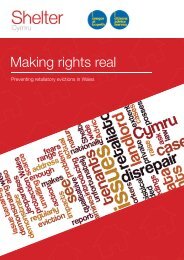

![Annual review [ 1.4 MB] - Citizens Advice](https://img.yumpu.com/50679529/1/190x135/annual-review-14-mb-citizens-advice.jpg?quality=85)

![Help for helping your residents [ 2.4 MB] - Citizens Advice](https://img.yumpu.com/48848542/1/185x260/help-for-helping-your-residents-24-mb-citizens-advice.jpg?quality=85)
